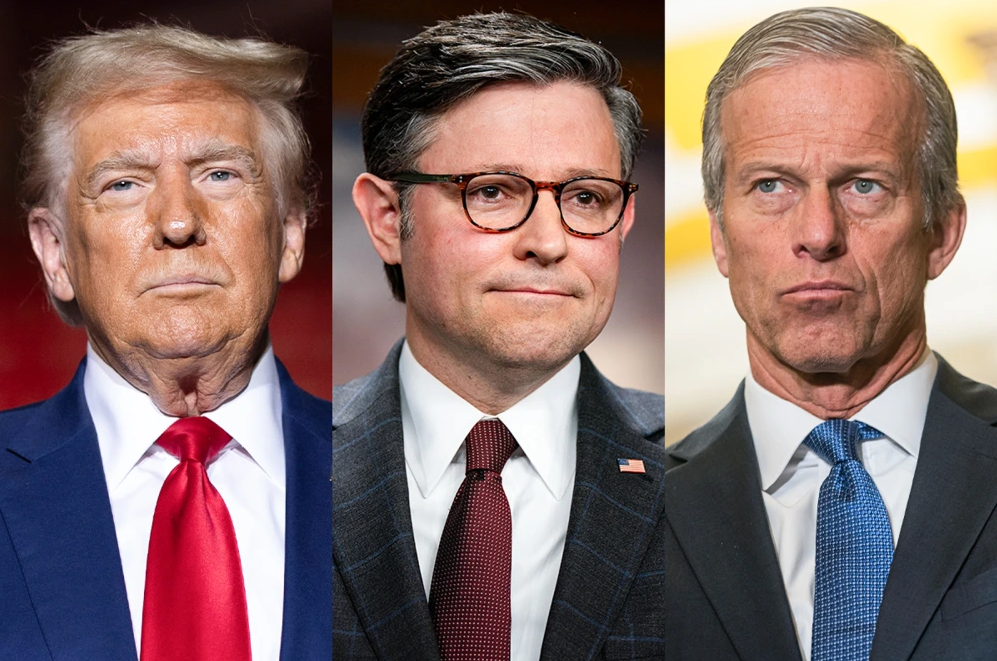
President-elect Donald Trump, House Speaker Mike Johnson, and Sen. John Thune are among the central political figures of 2025.
Donald Trump is poised to begin his second term, and while his personality is clear as day, his policies will evolve along with a confluence of domestic factors, including partisan politics, interest groups and economic conditions. Notably, the election process has highlighted how shifts in American social and political dynamics could steer Trump’s policy direction.
The United States. is in the midst of a new phase of sociopolitical flux, first and foremost marked by a resurgence of so-called conservatism. Historically, conservatism and liberalism have been the twin foundations of American political thinking, alternating in dominance. The ongoing social and political rifts in the U.S. fuel the intense rivalry between the two streams of thought. Conservatism appears to be gaining the upper hand, as evidenced by the election outcome and the Republican Party’s strongest showing in years.
From the unexpected 2016 victory to the decisive 2024 win for Trump, a conservative resurgence, with Trump as its face, reflects a cyclical pattern fundamentally rooted in public discontent with the Democratic Party’s focus on identity politics and its neoliberal agenda. Clearly, the pendulum swing between conservatism and liberalism remains a defining feature of American politics.
The reflection and recalibration of neoliberalism mark a significant shift in America’s socio-political landscape. In the years after the Cold War, U.S. elites have championed the “Washington Consensus” globally, underpinned by American democracy and unchecked marketization. From Clinton to Obama, and then to Biden, Democrats have long hailed neoliberalism as the ultimate solution to domestic governance and the maintenance of U.S. global supremacy.
However, this approach has hit a wall both within the U.S. and globally. A pivotal moment in the reassessment came when National Security Adviser Jake Sullivan introduced the notion of a “New Washington Consensus” during a 2023 Brookings Institution speech. Sullivan candidly acknowledged the old consensus’s negative effects — that market economies, globalization and free trade have “hollowed out” America, and economic integration has not fostered greater global responsibility or peace. Instead, these factors have frayed the socioeconomic foundations on which a strong and resilient democracy rests.
Sullivan’s perspective, emblematic of a new cohort of Democratic elites, represents a profound reassessment of America’s current dire dilemma: the fundamental shifts in its development trajectory and the underpinning status of neoliberalism in governance.
The rise of new ideologies is reshaping conventional American sociopolitical thought. In the recent election, the tech tycoons and their advocacy of “effective accelerationism” — a philosophical movement that advocates speeding up technological development, dissemination and application — emerged as a significant force. Tesla’s Elon Musk, a leading figure among tech magnates, donated $259 million to pro-Trump campaigns, marking a departure from Silicon Valley’s traditional leaning toward the Democratic Party, and propelling effective accelerationism into the limelight.
The movement is characterized by fervent support for tech advancement. It posits that humanity stands on the brink of a new tech revolution and calls for the unfettered advancement of innovation and tech deregulation. This is essential for human survival, proponents argue. Against the backdrop of tech-revolution, effective accelerationism aligns with Trump’s agenda, moving from the periphery to the center as a force that may shape the course of U.S. society and politics over the long run.
Evolving sociopolitical trends in the U.S. will influence Trump’s second term, with conservatism set to be an influential ideology. Despite Trump’s denial of endorsing the Heritage Foundation’s “Project 2025,” its themes of Christian nationalism, enhanced presidential power and government downsizing echo conservative views and may well influence Trump’s future policies. Neoliberals’ reflections and the Democrats’ realignment post-election could amplify conservative gains, potentially leading to swift policy reversals on issues such as immigration, abortion and climate change.
The convergence of conservatism and effective accelerationism mean great uncertainty. Both call for deregulation, which aligns with Trump’s governance penchant. But it could potentially exacerbate U.S. class tensions, inequality and social divisions, and there is no guarantee it will generate renewed tailwinds for American tech advancement in the wake of deregulation.
How these factors play out will undoubtedly determine the U.S. growth trajectory in the years ahead.